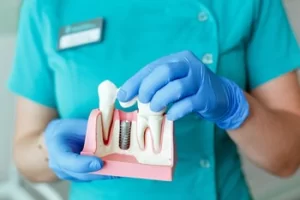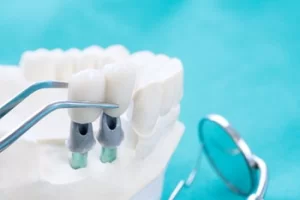Are you considering a root canal or dental implant to restore your missing tooth? It can take time to decide which treatment is right for you. In this blog post, we’ll explore the pros and cons of dental implants and root canals so that you can decide which route is best for your smile!
Dental Implants
Dental implants are artificial tooth roots that are a permanent base for a replacement tooth or bridge. They are typically made of titanium and placed directly into the jawbone, where they fuse with the surrounding bone. This creates a sturdy and long-lasting foundation for a dental crown or bridge, which is then securely attached to the implant. Dental implants are the best option for people who have lost one or more natural teeth due to injury, decay, or other reasons.
Dental Implant Procedure:
Losing a tooth can be a traumatising experience, especially if it happens unexpectedly. Fortunately, dental implant treatment can replace the missing tooth through implant placement and restore your smile to its former glory. Getting a dental implant involves several steps, including a consultation with a dental specialist who will determine if you are a suitable candidate for the treatment.
If you have missing teeth, the dentist will create a personalised treatment plan and schedule surgery to place the tooth implant into your jawbone. This stage is crucial and requires high precision, as the implant must be positioned correctly to ensure stability and long-term success.
After the dental implant, you must provide proper care and maintenance to ensure the implant integrates fully with your jawbone and functions correctly. If you follow the post-operative instructions carefully, you can rest assured that your new tooth implant will permanently solve your missing tooth.
Pros of Dental Implants:
Durability and Longevity
Dental implants are most commonly known for their durability and long-lasting nature. With proper care and maintenance, implants can last a lifetime, making them an excellent investment for dental health.
Natural Look and Feel
Implants are manufactured to look and feel like natural teeth, making them ideal for restoring your smile and normal chewing function.
Oral Health Benefits
Dental implants provide numerous oral health benefits, such as preventing bone loss, improving bite alignment, and reducing the risk of gum disease and other oral health problems.
Improved Confidence and Self-Esteem
Missing teeth can cause embarrassment, decrease self-confidence, and negatively impact your overall quality of life. Dental implants can retrieve your smile and improve your confidence, allowing you to live your life to the fullest.
Cons of Dental Implants:
Surgery Required
Implant surgery involves an invasive procedure, meaning a small incision must be made in your gum tissue. While the procedure is generally safe, any surgery carries some inherent risks.
Healing Time
After the implant is inserted, it takes several months to heal and integrate with the surrounding bone fully. During this time, you may need to avoid certain foods and follow strict post-operative care instructions to avoid problems like severe tooth decay.
Not Suitable for Everyone
Dental implant placement requires a certain level of bone density to be successful, meaning it may only be a suitable option for some. Sometimes, bone grafting or other prior treatments may be required to prepare the jawbone for implant placement.
Costs
The cost is often a significant concern for many patients when considering dental implants as a tooth restoration option. The cost of dental implants can vary depending on various factors, including the patient’s needs, the procedure’s complexity, and the dental clinic’s location.
The cost estimate of a single dental implant can range from $1,500, on average. While this may seem like a steep expense, it’s important to consider dental implants’ long-term benefits and durability. With proper upkeep and maintenance, dental implants can last longer, making them a cost-effective solution compared to other tooth replacement options that may require regular adjustments or replacement.
In some cases, dental insurance may make up for some dental implant costs. However, coverage varies widely between different insurance plans, and it’s important to check with your provider to determine what is covered under your specific policy.
Additionally, some dental practices offer financing options to help spread out the cost of dental implants over time. This option can be attractive for patients needing more funds to cover the entire procedure cost upfront.
Root Canals
A root canal treatment, also commonly known as endodontic treatment, is a dental procedure used to repair and restore a tooth that is severely damaged, infected, or has extensive decay.
During a root canal treatment, the pulp and nerve of the affected tooth are removed, and the inside of the tooth is thoroughly cleaned and disinfected. The tooth is then filled and sealed with a dental filling or crown to prevent further infection or damage.
Root canal treatments are typically necessary when the soft tissue inside the tooth, known as the pulp, becomes inflamed or infected. This can occur due to several factors, including deep decay, repeated dental procedures on the same tooth, and injury to the tooth. Without root canal treatment, the infected tooth can cause significant pain, abscesses, and tooth loss.
The procedure of getting a root canal

The initial root canal treatment step is administering a local anaesthetic to numb the affected tooth and surrounding area. This helps to minimise pain and discomfort during root canal therapy.
The next step will be that the dentist will create an opening in the top of the tooth to access the pulp chamber and tooth root canals. Using specialised tools, they will carefully remove the infected or damaged pulp from the tooth, preserving the integrity of the surrounding tooth structure.
Once the pulp has been extracted, the dentist will thoroughly clean and disinfect the inside of the tooth, making sure to remove any bacteria or debris that may be present. They may also use an antimicrobial irrigant to flush out the root canals and ensure that all of the infected material has been removed.
After the tooth has been thoroughly cleaned, the dentist will fill the root canals with a rubber-like material called gutta-percha. This helps to seal the canals and prevent further infection or damage. They will then place a temporary filling over the opening to protect the tooth while it heals.
In most cases, patients must return to the dentist for a follow-up appointment to have a permanent filling or dental crown placed over the affected tooth. This helps to restore the tooth structure and prevent further damage or decay.
Pros of Root Canals:
Saves Natural Tooth
Root canal therapy can often save a natural tooth that would otherwise need to be extracted. This helps preserve your smile’s integrity and avoid the need for costly tooth replacement options.
Relieves Pain
Root canal therapy is often necessary when there is an infected pulp inside the tooth or inflamed, causing significant pain. The procedure can help to relieve this pain and restore normal tooth function.
Cost-Effective
Often, a root canal can be more cost-effective than tooth extraction and replacement. Patients can avoid the expense of more complex dental procedures by preserving the natural tooth.
Cons of Root Canals:
It may Require Multiple Appointments.
Depending on the severity of the infection or damage, a root canal procedure may require multiple appointments. This can be inconvenient and time-consuming for some patients.
Post-Operative Discomfort
After a root canal procedure, patients may experience some discomfort or swelling as the tooth heals. This can be managed with over-the-counter pain medication and typically resolves within a few days.
Risk of Complications
Although root canals are generally safe and effective, there is always a risk of complications, such as infection or damage to surrounding teeth. It’s important to discuss any concerns with your dental specialist to ensure the best possible outcome.
Costs
Root canal cost can vary depending on several factors, including the location of the affected tooth, the severity of the infection or damage, and the type of restoration used to fill the tooth. On average, a root canal can cost from $300, depending on the complexity of the procedure.
It’s important to note that many dental insurance plans cover at least part of the cost of a root canal procedure. However, coverage can vary widely between policies, so it’s important to check with your insurance provider to determine what is covered under your plan.
People who do not have dental insurance or whose insurance does not cover the full cost of the procedure may be able to work out a payment plan with their dental provider. This can make the expense more manageable over time.
Ultimately, a root canal’s cost may be worth preserving a natural tooth and avoiding more costly tooth replacement options. It’s important to discuss your case with a dental specialist to determine what options are available to you.
Comparing Dental Implants and Root Canals
When restoring a tooth, root canal vs implant are two common options. Both have unique advantages and disadvantages that should be considered when deciding which treatment is right for you.
Dental implants are artificial tooth roots made of titanium and placed directly into your jawbone. They are a long-lasting and sturdy option for people with one or more missing teeth due to injury, decay, or other reasons. On the other hand, a root canal is a procedure that repairs and saves a severely damaged or infected tooth. During this treatment, the infected or damaged pulp inside your tooth is removed and replaced with a filling to prevent further damage.
One of the major pros of dental implants is their durability. Proper care and maintenance can last a lifetime, making them a great investment for many individuals. They are also designed to mimic the look and feel of natural teeth, which can help improve your smile and chewing function. Additionally, dental implants have a high success rate of up to 98%, meaning they are a safe and effective solution for tooth restoration.
However, there are some downsides to dental implants. Getting a dental implant can be expensive and time-consuming, as the entire process can take several months. In addition, implant surgery is required, which involves a minor surgical procedure that carries inherent risks. Moreover, dental implants may only be suitable for some, as they need a certain level of bone density for successful placement.
On the other hand, root canals are an effective way to save a natural tooth that would otherwise need to be extracted. Not only does this solution preserve your existing teeth, but it is often a more cost-effective option than tooth extraction and replacement. Additionally, root canals can relieve pain caused by infected or inflamed pulp, and dental specialists have achieved a high success rate of up to 95% with this procedure.
However, root canals may require multiple appointments to complete fully, and patients may experience discomfort and swelling post-procedure. They also risk potential complications, such as infection or damage to surrounding teeth.
Conclusion
When considering which procedure best suits your dental issue and needs, it is important to weigh the options carefully. As a professional dental practice in Sydney, we understand the complexity of such decisions and are here to help. Our team of qualified dentists have vast experience with root canals and implants and can assist you on the journey to a more confident smile. Our experienced professionals are just one phone call away; reach out at (02) 8203 8760 for any questions regarding dental implants vs root canals – we’d be joyful to answer them! In addition, be sure to visit our website for any further information or up-to-date offers related to these treatments.
References
https://www.healthline.com/health/dental-and-oral-health/root-canal-vs-implant
https://research-archive.org/index.php/rars/preprint/view/96






Recent Comments